Mobile app
Remindr
Remindr
Remindr is a personal project—a reminder app that aims to simplify the planning and management of daily activities
Remindr is a personal project—a reminder app that aims to simplify the planning and management of daily activities
Remindr is a personal project—a reminder app that aims to simplify the planning and management of daily activities
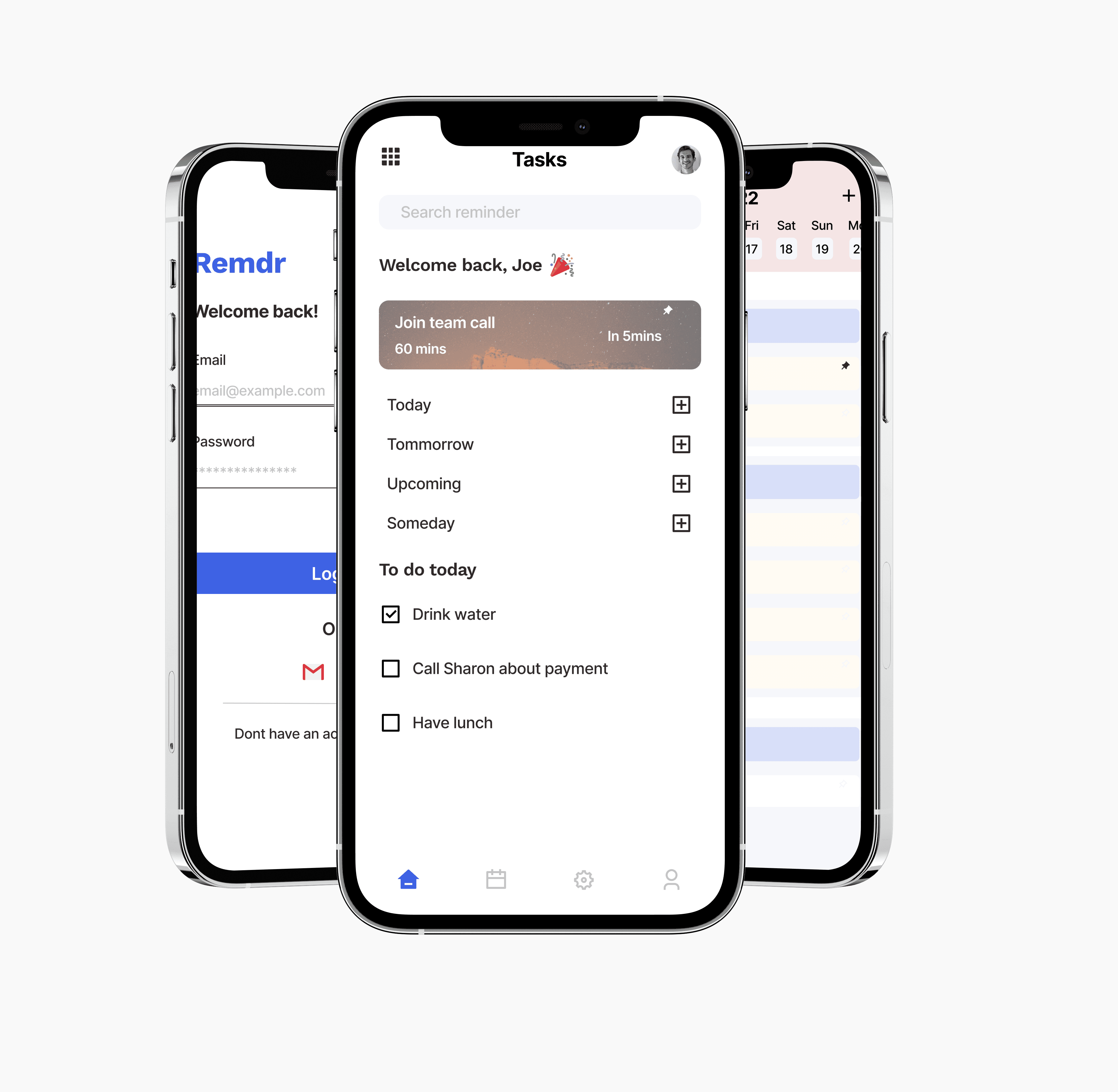
My Role
My Role
My Role
Product Design
User research
Product Design
User research
Product Design
User research
Tools
Tools
Tools
Figma (design)
Notion (Documentation)
Figma
Notion
Figma (design)
Notion
Duration
Duration
Duration
2 weeks
2 weeks
2 weeks
Introduction
Introduction
Introduction
Remindr is a personal project—a reminder app that aims to simplify the planning and management of daily activities. The app provides users with a convenient platform to access their calendar, set tags, create priority lists, and customize themes for easy accessibility. With Remindr, users can seamlessly integrate their existing calendar to have a comprehensive view of their schedule. This feature ensures that users can stay organized and effectively plan their day by syncing their events and tasks in one place. The app also offers the capability to set tags, allowing users to categorize their activities based on different criteria such as work, personal, fitness, or any other customized tags they prefer. This enables users to easily filter and find specific tasks when needed. Additionally, Remindr includes a priority list feature that allows users to assign priorities to their tasks. By creating priority lists, users can focus on the most important activities and ensure that they are completed in a timely manner. To enhance the user experience, Remindr offers customizable themes. Users can select their preferred theme, such as light or dark mode, to suit their visual preferences and improve accessibility. Overall, Remindr is designed to provide a user-friendly and efficient solution for planning and managing daily activities. It offers seamless calendar integration, tag-based organization, priority setting, and customizable themes to enhance the user's productivity and simplify their daily routine.
Remindr is a personal project—a reminder app that aims to simplify the planning and management of daily activities. The app provides users with a convenient platform to access their calendar, set tags, create priority lists, and customize themes for easy accessibility. With Remindr, users can seamlessly integrate their existing calendar to have a comprehensive view of their schedule. This feature ensures that users can stay organized and effectively plan their day by syncing their events and tasks in one place. The app also offers the capability to set tags, allowing users to categorize their activities based on different criteria such as work, personal, fitness, or any other customized tags they prefer. This enables users to easily filter and find specific tasks when needed. Additionally, Remindr includes a priority list feature that allows users to assign priorities to their tasks. By creating priority lists, users can focus on the most important activities and ensure that they are completed in a timely manner. To enhance the user experience, Remindr offers customizable themes. Users can select their preferred theme, such as light or dark mode, to suit their visual preferences and improve accessibility. Overall, Remindr is designed to provide a user-friendly and efficient solution for planning and managing daily activities. It offers seamless calendar integration, tag-based organization, priority setting, and customizable themes to enhance the user's productivity and simplify their daily routine.
Remindr is a personal project—a reminder app that aims to simplify the planning and management of daily activities. The app provides users with a convenient platform to access their calendar, set tags, create priority lists, and customize themes for easy accessibility. With Remindr, users can seamlessly integrate their existing calendar to have a comprehensive view of their schedule. This feature ensures that users can stay organized and effectively plan their day by syncing their events and tasks in one place. The app also offers the capability to set tags, allowing users to categorize their activities based on different criteria such as work, personal, fitness, or any other customized tags they prefer. This enables users to easily filter and find specific tasks when needed. Additionally, Remindr includes a priority list feature that allows users to assign priorities to their tasks. By creating priority lists, users can focus on the most important activities and ensure that they are completed in a timely manner. To enhance the user experience, Remindr offers customizable themes. Users can select their preferred theme, such as light or dark mode, to suit their visual preferences and improve accessibility. Overall, Remindr is designed to provide a user-friendly and efficient solution for planning and managing daily activities. It offers seamless calendar integration, tag-based organization, priority setting, and customizable themes to enhance the user's productivity and simplify their daily routine.
Problem Statement
Problem Statement
Problem Statement
As people become increasingly busy, it is becoming challenging for individuals to remember every detail and effectively manage their daily activities. This creates a need for a platform that can assist in solving this problem. While alarms can wake you up early, and reminder apps can help you stay organized, there is still room for improvement in streamlining daily activities for individuals, regardless of whether they are busy professionals or simply trying to stay on track.
The goal of this platform, called Remindr, is to provide a solution that enables users to effortlessly manage their daily schedules. By allowing users to set specific times and priorities for their activities, Remindr aims to help individuals stay on track and have a smooth and productive day.
As people become increasingly busy, it is becoming challenging for individuals to remember every detail and effectively manage their daily activities. This creates a need for a platform that can assist in solving this problem. While alarms can wake you up early, and reminder apps can help you stay organized, there is still room for improvement in streamlining daily activities for individuals, regardless of whether they are busy professionals or simply trying to stay on track.
The goal of this platform, called Remindr, is to provide a solution that enables users to effortlessly manage their daily schedules. By allowing users to set specific times and priorities for their activities, Remindr aims to help individuals stay on track and have a smooth and productive day.
As people become increasingly busy, it is becoming challenging for individuals to remember every detail and effectively manage their daily activities. This creates a need for a platform that can assist in solving this problem. While alarms can wake you up early, and reminder apps can help you stay organized, there is still room for improvement in streamlining daily activities for individuals, regardless of whether they are busy professionals or simply trying to stay on track.
The goal of this platform, called Remindr, is to provide a solution that enables users to effortlessly manage their daily schedules. By allowing users to set specific times and priorities for their activities, Remindr aims to help individuals stay on track and have a smooth and productive day.
Project Goal
Project Goal
Project Goal
The goals of the project are as follows:
Activity Management: Develop a user-friendly app that enables users to efficiently manage all their daily activities from a single platform. The app should provide an intuitive interface for users to input and organize their tasks effectively.
Priority List: Implement a feature that allows users to create and customize priority lists based on the importance of their tasks. The app should provide the ability to assign priorities and dynamically update the list as tasks are completed or modified.
Staying on Track: Ensure that the app aids users in staying on track with their daily activities. This includes providing timely reminders, notifications, and alerts for upcoming tasks or events. The app should help users maintain productivity and meet their goals throughout the day.
Integration with Third-Party Calendars: Enable users to connect and synchronize their Remindr app with popular third-party calendars such as Google Calendar, Apple Calendar, and other trusted platforms. This integration will allow users to view and manage their existing calendar events seamlessly within the Remindr app, providing a centralized hub for all their scheduling needs.
By achieving these project goals, Remindr aims to simplify and streamline the daily activity management process for users, enhancing their productivity and ensuring a smooth and efficient day-to-day experience.
The goals of the project are as follows:
Activity Management: Develop a user-friendly app that enables users to efficiently manage all their daily activities from a single platform. The app should provide an intuitive interface for users to input and organize their tasks effectively.
Priority List: Implement a feature that allows users to create and customize priority lists based on the importance of their tasks. The app should provide the ability to assign priorities and dynamically update the list as tasks are completed or modified.
Staying on Track: Ensure that the app aids users in staying on track with their daily activities. This includes providing timely reminders, notifications, and alerts for upcoming tasks or events. The app should help users maintain productivity and meet their goals throughout the day.
Integration with Third-Party Calendars: Enable users to connect and synchronize their Remindr app with popular third-party calendars such as Google Calendar, Apple Calendar, and other trusted platforms. This integration will allow users to view and manage their existing calendar events seamlessly within the Remindr app, providing a centralized hub for all their scheduling needs.
By achieving these project goals, Remindr aims to simplify and streamline the daily activity management process for users, enhancing their productivity and ensuring a smooth and efficient day-to-day experience.
The goals of the project are as follows:
Activity Management: Develop a user-friendly app that enables users to efficiently manage all their daily activities from a single platform. The app should provide an intuitive interface for users to input and organize their tasks effectively.
Priority List: Implement a feature that allows users to create and customize priority lists based on the importance of their tasks. The app should provide the ability to assign priorities and dynamically update the list as tasks are completed or modified.
Staying on Track: Ensure that the app aids users in staying on track with their daily activities. This includes providing timely reminders, notifications, and alerts for upcoming tasks or events. The app should help users maintain productivity and meet their goals throughout the day.
Integration with Third-Party Calendars: Enable users to connect and synchronize their Remindr app with popular third-party calendars such as Google Calendar, Apple Calendar, and other trusted platforms. This integration will allow users to view and manage their existing calendar events seamlessly within the Remindr app, providing a centralized hub for all their scheduling needs.
By achieving these project goals, Remindr aims to simplify and streamline the daily activity management process for users, enhancing their productivity and ensuring a smooth and efficient day-to-day experience.
Design Process
Design Process



Empathize
Empathize
Empathize
Research
Research
Research
To gain insights into the pain points and needs of users regarding daily activity management, i conducted an online research. This research involved studying existing platforms and gathering user feedback. Additionally, an online survey(quantitative research) was also conducted to gather more specific information about users' current approaches to managing their daily activities and their pain points.
The online survey aimed to collect datas like:
User Pain Points: The survey inquired about the challenges and difficulties users face when managing their daily activities. It aimed to understand the specific pain points and frustrations users encounter in their current methods.
User Needs: The survey sought to identify the specific needs and requirements of users regarding daily activity management. It aimed to uncover the desired features and functionalities that users consider important for an ideal solution.
Current Activity Management Methods: Users were asked about their current approaches to managing their daily activities. This included understanding whether they relied on alarms, reminders, or other tools, and how effective these methods were for them.
The online survey was designed to gather quantitative and qualitative data, providing a comprehensive understanding of users' perspectives and requirements. The research process involved analyzing the survey responses and identifying common pain points and needs shared by the users.
By conducting this research, the goal was to inform the design and development of the Remindr app, ensuring that it addresses the specific pain points and fulfills the needs of its target users.
To gain insights into the pain points and needs of users regarding daily activity management, i conducted an online research. This research involved studying existing platforms and gathering user feedback. Additionally, an online survey(quantitative research) was also conducted to gather more specific information about users' current approaches to managing their daily activities and their pain points.
The online survey aimed to collect datas like:
User Pain Points: The survey inquired about the challenges and difficulties users face when managing their daily activities. It aimed to understand the specific pain points and frustrations users encounter in their current methods.
User Needs: The survey sought to identify the specific needs and requirements of users regarding daily activity management. It aimed to uncover the desired features and functionalities that users consider important for an ideal solution.
Current Activity Management Methods: Users were asked about their current approaches to managing their daily activities. This included understanding whether they relied on alarms, reminders, or other tools, and how effective these methods were for them.
The online survey was designed to gather quantitative and qualitative data, providing a comprehensive understanding of users' perspectives and requirements. The research process involved analyzing the survey responses and identifying common pain points and needs shared by the users.
By conducting this research, the goal was to inform the design and development of the Remindr app, ensuring that it addresses the specific pain points and fulfills the needs of its target users.
To gain insights into the pain points and needs of users regarding daily activity management, i conducted an online research. This research involved studying existing platforms and gathering user feedback. Additionally, an online survey(quantitative research) was also conducted to gather more specific information about users' current approaches to managing their daily activities and their pain points.
The online survey aimed to collect datas like:
User Pain Points: The survey inquired about the challenges and difficulties users face when managing their daily activities. It aimed to understand the specific pain points and frustrations users encounter in their current methods.
User Needs: The survey sought to identify the specific needs and requirements of users regarding daily activity management. It aimed to uncover the desired features and functionalities that users consider important for an ideal solution.
Current Activity Management Methods: Users were asked about their current approaches to managing their daily activities. This included understanding whether they relied on alarms, reminders, or other tools, and how effective these methods were for them.
The online survey was designed to gather quantitative and qualitative data, providing a comprehensive understanding of users' perspectives and requirements. The research process involved analyzing the survey responses and identifying common pain points and needs shared by the users.
By conducting this research, the goal was to inform the design and development of the Remindr app, ensuring that it addresses the specific pain points and fulfills the needs of its target users.
Target Audience
Target Audience
Target Audience
Based on the survey results, the targeted audience for the Remindr app is estimated to be within the age range of 16 to 50 years old. The audience comprises individuals with diverse backgrounds and occupations, including:
Students: This group consists of individuals who are enrolled in educational institutions, such as high school or university students. They may have a busy schedule with classes, assignments, and extracurricular activities.
Essential Workers: This category includes individuals who work in essential services, such as healthcare professionals, emergency service providers, and essential retail workers. They have demanding jobs that require them to manage their time efficiently.
Housewives: This group comprises individuals primarily responsible for managing household tasks and taking care of the family. They may have a wide range of responsibilities, including organizing household chores, appointments, and family events.
Non-essential Workers: This category encompasses individuals who work in non-essential sectors such as office jobs, retail, or service industries. They may have varying daily activities and responsibilities that need effective management.
The diverse range of occupations and responsibilities within the identified age range highlights the need for an app like Remindr. By catering to the requirements of students, essential workers, housewives, and non-essential workers, Remindr aims to provide a comprehensive solution that helps individuals stay organized, manage their daily activities efficiently, and achieve their goals.
Based on the survey results, the targeted audience for the Remindr app is estimated to be within the age range of 16 to 50 years old. The audience comprises individuals with diverse backgrounds and occupations, including:
Students: This group consists of individuals who are enrolled in educational institutions, such as high school or university students. They may have a busy schedule with classes, assignments, and extracurricular activities.
Essential Workers: This category includes individuals who work in essential services, such as healthcare professionals, emergency service providers, and essential retail workers. They have demanding jobs that require them to manage their time efficiently.
Housewives: This group comprises individuals primarily responsible for managing household tasks and taking care of the family. They may have a wide range of responsibilities, including organizing household chores, appointments, and family events.
Non-essential Workers: This category encompasses individuals who work in non-essential sectors such as office jobs, retail, or service industries. They may have varying daily activities and responsibilities that need effective management.
The diverse range of occupations and responsibilities within the identified age range highlights the need for an app like Remindr. By catering to the requirements of students, essential workers, housewives, and non-essential workers, Remindr aims to provide a comprehensive solution that helps individuals stay organized, manage their daily activities efficiently, and achieve their goals.
Based on the survey results, the targeted audience for the Remindr app is estimated to be within the age range of 16 to 50 years old. The audience comprises individuals with diverse backgrounds and occupations, including:
Students: This group consists of individuals who are enrolled in educational institutions, such as high school or university students. They may have a busy schedule with classes, assignments, and extracurricular activities.
Essential Workers: This category includes individuals who work in essential services, such as healthcare professionals, emergency service providers, and essential retail workers. They have demanding jobs that require them to manage their time efficiently.
Housewives: This group comprises individuals primarily responsible for managing household tasks and taking care of the family. They may have a wide range of responsibilities, including organizing household chores, appointments, and family events.
Non-essential Workers: This category encompasses individuals who work in non-essential sectors such as office jobs, retail, or service industries. They may have varying daily activities and responsibilities that need effective management.
The diverse range of occupations and responsibilities within the identified age range highlights the need for an app like Remindr. By catering to the requirements of students, essential workers, housewives, and non-essential workers, Remindr aims to provide a comprehensive solution that helps individuals stay organized, manage their daily activities efficiently, and achieve their goals.
User Persona
User Persona
User Persona
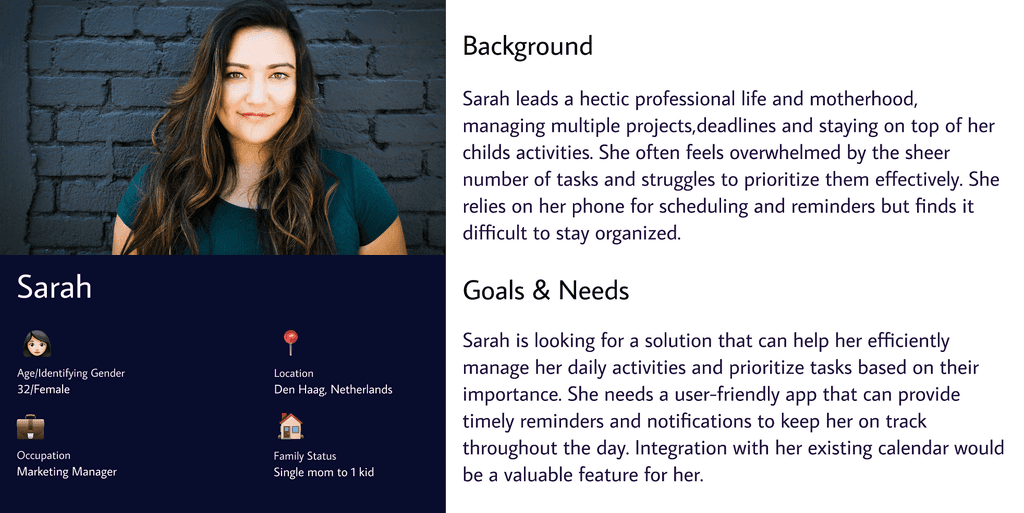


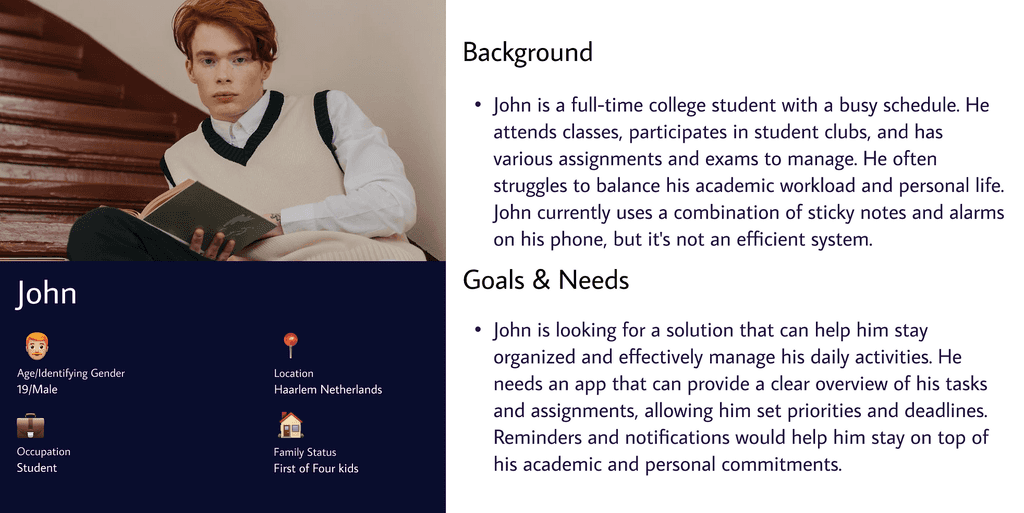


These personas are based on the survey data and represent typical users with distinct needs and goals. They also served as reference points during the design process, helping me make informed decisions about features, user interface, and the overall user experience.
These personas are based on the survey data and represent typical users with distinct needs and goals. They also served as reference points during the design process, helping me make informed decisions about features, user interface, and the overall user experience.
These personas are based on the survey data and represent typical users with distinct needs and goals. They also served as reference points during the design process, helping me make informed decisions about features, user interface, and the overall user experience.
Define
Define
Define
Research Findings
Research Findings
Research Findings
The research conducted revealed that individuals lead busy lives and have a strong desire for a platform that can keep them informed and up-to-date with their daily to-do lists. Based on these findings, several key features were identified and developed to address the needs of the target audience.
The features derived from the research include:
Task Management: The platform offers a comprehensive task management system that allows users to input, organize, and prioritize their daily activities. This feature ensures that users can easily keep track of their tasks and stay on top of their responsibilities.
Notifications and Alerts: The platform incorporates a notification system that sends timely reminders and alerts to users. This feature ensures that users are promptly notified of upcoming tasks and important deadlines, helping them stay on schedule and avoid missing any important activities.
Priority Setting: The platform allows users to set priorities for their tasks. This feature enables individuals to identify and focus on the most important activities, ensuring that they allocate their time and energy effectively.
Calendar Integration: The platform seamlessly integrates with popular calendar applications such as Google Calendar and Apple Calendar. This integration enables users to synchronize their schedules and seamlessly manage their activities from a single platform.
By incorporating these features, the platform aims to provide users with a reliable and efficient tool for managing their daily activities. It addresses the needs identified during the research, helping individuals stay organized, on track, and up to date with their respective to-do lists.
The research conducted revealed that individuals lead busy lives and have a strong desire for a platform that can keep them informed and up-to-date with their daily to-do lists. Based on these findings, several key features were identified and developed to address the needs of the target audience.
The features derived from the research include:
Task Management: The platform offers a comprehensive task management system that allows users to input, organize, and prioritize their daily activities. This feature ensures that users can easily keep track of their tasks and stay on top of their responsibilities.
Notifications and Alerts: The platform incorporates a notification system that sends timely reminders and alerts to users. This feature ensures that users are promptly notified of upcoming tasks and important deadlines, helping them stay on schedule and avoid missing any important activities.
Priority Setting: The platform allows users to set priorities for their tasks. This feature enables individuals to identify and focus on the most important activities, ensuring that they allocate their time and energy effectively.
Calendar Integration: The platform seamlessly integrates with popular calendar applications such as Google Calendar and Apple Calendar. This integration enables users to synchronize their schedules and seamlessly manage their activities from a single platform.
By incorporating these features, the platform aims to provide users with a reliable and efficient tool for managing their daily activities. It addresses the needs identified during the research, helping individuals stay organized, on track, and up to date with their respective to-do lists.
The research conducted revealed that individuals lead busy lives and have a strong desire for a platform that can keep them informed and up-to-date with their daily to-do lists. Based on these findings, several key features were identified and developed to address the needs of the target audience.
The features derived from the research include:
Task Management: The platform offers a comprehensive task management system that allows users to input, organize, and prioritize their daily activities. This feature ensures that users can easily keep track of their tasks and stay on top of their responsibilities.
Notifications and Alerts: The platform incorporates a notification system that sends timely reminders and alerts to users. This feature ensures that users are promptly notified of upcoming tasks and important deadlines, helping them stay on schedule and avoid missing any important activities.
Priority Setting: The platform allows users to set priorities for their tasks. This feature enables individuals to identify and focus on the most important activities, ensuring that they allocate their time and energy effectively.
Calendar Integration: The platform seamlessly integrates with popular calendar applications such as Google Calendar and Apple Calendar. This integration enables users to synchronize their schedules and seamlessly manage their activities from a single platform.
By incorporating these features, the platform aims to provide users with a reliable and efficient tool for managing their daily activities. It addresses the needs identified during the research, helping individuals stay organized, on track, and up to date with their respective to-do lists.
Information Architecture
Information Architecture
Information Architecture
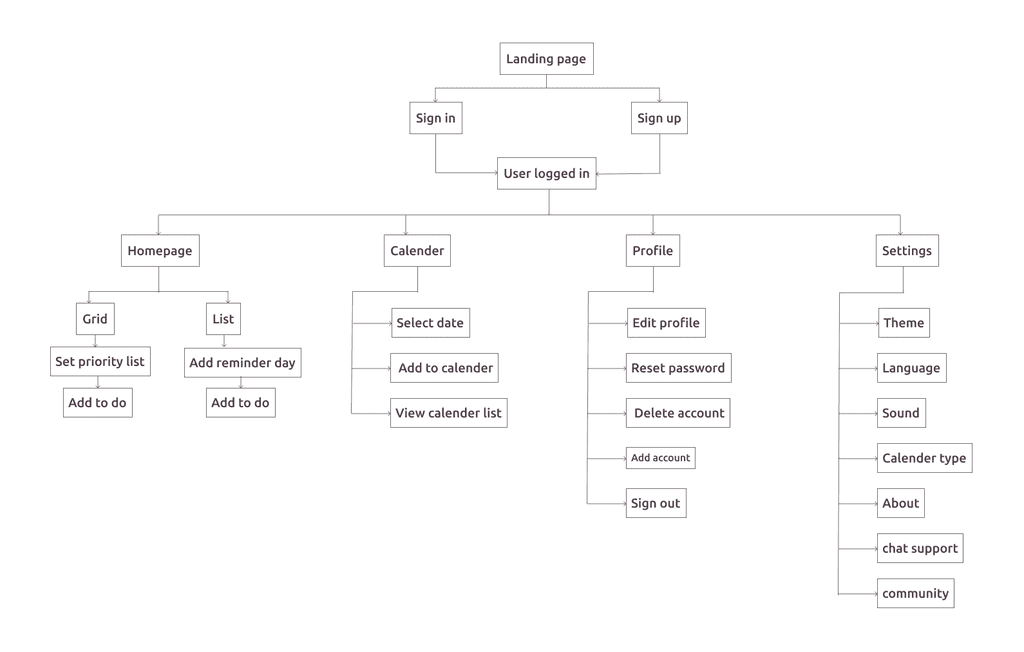


Ideate
Ideate
Ideate
Low Fidelity
Low Fidelity
Low Fidelity
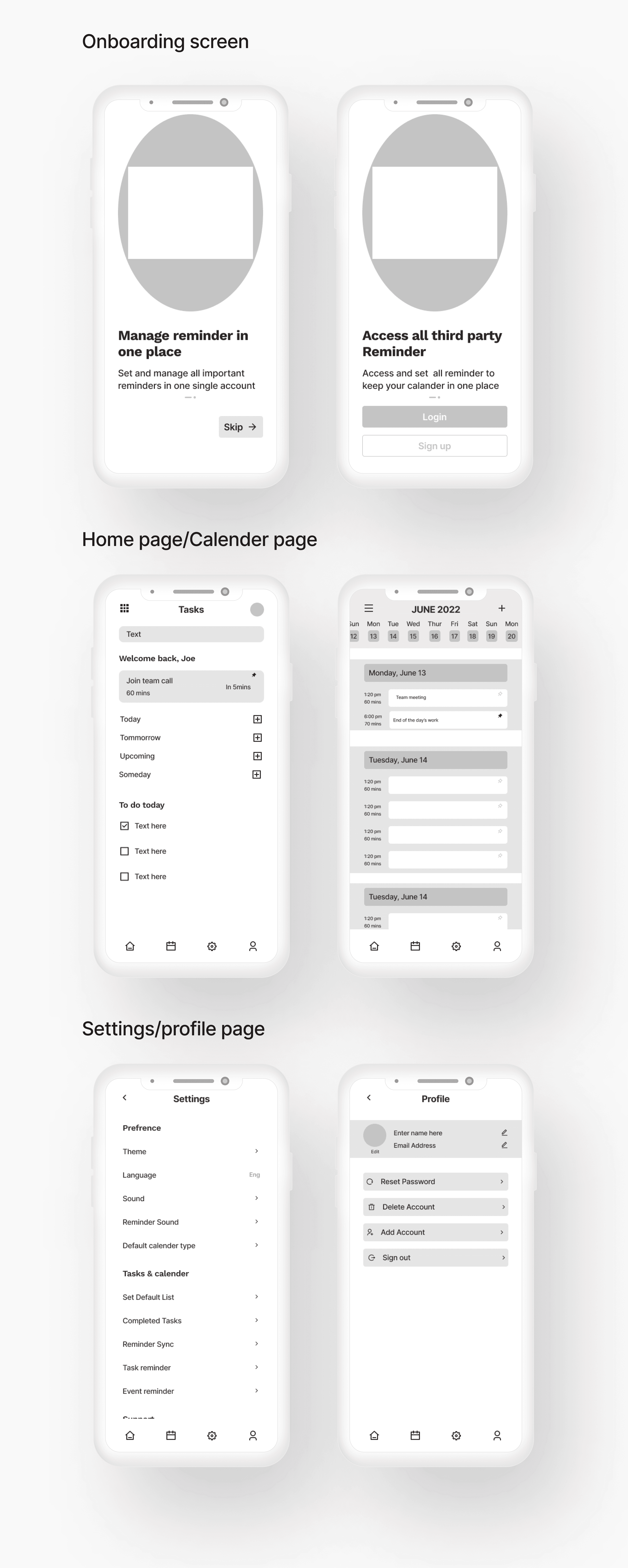


Testing
Testing
Testing
After designing the low fidelity mockups based on features obtained from the research, I went on to prototype them and sent a link to my participant and got them tested using protopie.. From this study, it was recorded that
After designing the low fidelity mockups based on features obtained from the research, I went on to prototype them and sent a link to my participant and got them tested using protopie.. From this study, it was recorded that
After designing the low fidelity mockups based on features obtained from the research, I went on to prototype them and sent a link to my participant and got them tested using protopie.. From this study, it was recorded that
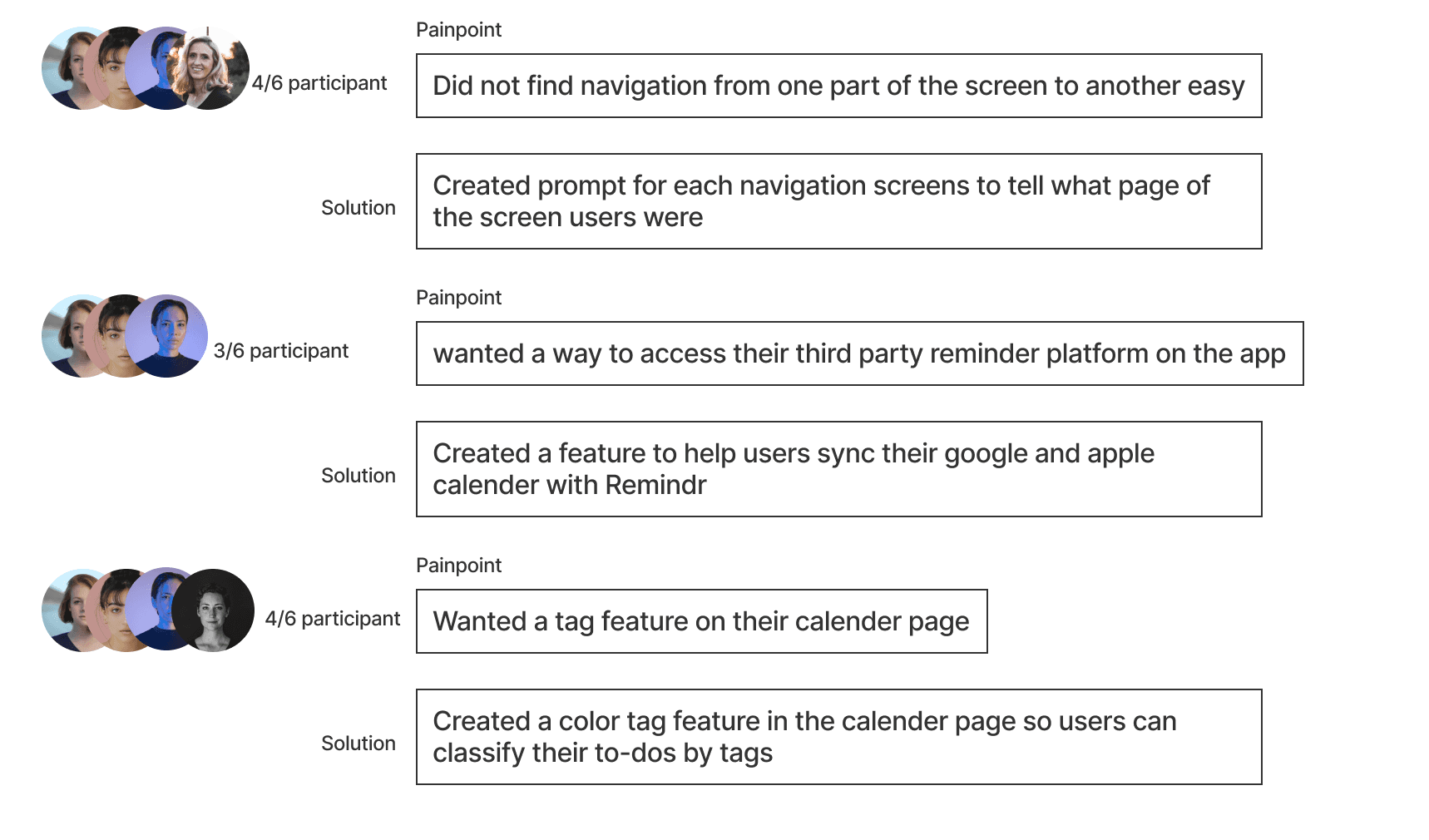


High Fidelity
High Fidelity
High Fidelity



Key Takeaways
Key Takeaways
Key Takeaways
User-Friendly Design
The positive feedback received from participants indicates that the user interface and overall design of the app were intuitive and easy to use. This highlights the importance of prioritizing user experience in the design process to ensure that users can navigate the app effortlessly.
Effective Task Management
The participants' appreciation for the task management feature validates the importance of providing users with a comprehensive and flexible system for organizing their daily activities. It reinforces the need to prioritize features that enable users to input, prioritize, and manage their tasks effectively.
Timely Notifications and Alerts
The positive reception of the notifications and alerts feature highlights its significance in helping users stay on track and meet their deadlines. This emphasizes the importance of providing timely reminders without being intrusive, enabling users to stay informed and manage their time effectively.
Seamless Calendar Integration
Participants' satisfaction with the integration of popular calendar applications underscores the value of centralizing users' events and tasks in one place. This integration simplifies users' lives by allowing them to view and manage their schedules without switching between different apps.
Continuous Iteration and Improvement
The user testing study provided valuable feedback that can be used to refine and enhance the app's design and functionality. It emphasizes the importance of an iterative design process that involves incorporating user feedback and making necessary improvements to create a user-centric product.
Meeting Diverse User Needs
The positive responses from participants belonging to various occupations and age groups highlight the app's ability to cater to a wide range of users with different daily activity management needs. It affirms the importance of considering the diverse needs of the target audience during the design process.
These learnings and takeaways provide valuable insights for further refining and optimizing the app's design, features, and user experience. They reinforce the significance of user feedback and iterative design in creating a successful and user-centric product like the one being developed.
User-Friendly Design
The positive feedback received from participants indicates that the user interface and overall design of the app were intuitive and easy to use. This highlights the importance of prioritizing user experience in the design process to ensure that users can navigate the app effortlessly.
Effective Task Management
The participants' appreciation for the task management feature validates the importance of providing users with a comprehensive and flexible system for organizing their daily activities. It reinforces the need to prioritize features that enable users to input, prioritize, and manage their tasks effectively.
Timely Notifications and Alerts
The positive reception of the notifications and alerts feature highlights its significance in helping users stay on track and meet their deadlines. This emphasizes the importance of providing timely reminders without being intrusive, enabling users to stay informed and manage their time effectively.
Seamless Calendar Integration
Participants' satisfaction with the integration of popular calendar applications underscores the value of centralizing users' events and tasks in one place. This integration simplifies users' lives by allowing them to view and manage their schedules without switching between different apps.
Continuous Iteration and Improvement
The user testing study provided valuable feedback that can be used to refine and enhance the app's design and functionality. It emphasizes the importance of an iterative design process that involves incorporating user feedback and making necessary improvements to create a user-centric product.
Meeting Diverse User Needs
The positive responses from participants belonging to various occupations and age groups highlight the app's ability to cater to a wide range of users with different daily activity management needs. It affirms the importance of considering the diverse needs of the target audience during the design process.
These learnings and takeaways provide valuable insights for further refining and optimizing the app's design, features, and user experience. They reinforce the significance of user feedback and iterative design in creating a successful and user-centric product like the one being developed.
User-Friendly Design
The positive feedback received from participants indicates that the user interface and overall design of the app were intuitive and easy to use. This highlights the importance of prioritizing user experience in the design process to ensure that users can navigate the app effortlessly.
Effective Task Management
The participants' appreciation for the task management feature validates the importance of providing users with a comprehensive and flexible system for organizing their daily activities. It reinforces the need to prioritize features that enable users to input, prioritize, and manage their tasks effectively.
Timely Notifications and Alerts
The positive reception of the notifications and alerts feature highlights its significance in helping users stay on track and meet their deadlines. This emphasizes the importance of providing timely reminders without being intrusive, enabling users to stay informed and manage their time effectively.
Seamless Calendar Integration
Participants' satisfaction with the integration of popular calendar applications underscores the value of centralizing users' events and tasks in one place. This integration simplifies users' lives by allowing them to view and manage their schedules without switching between different apps.
Continuous Iteration and Improvement
The user testing study provided valuable feedback that can be used to refine and enhance the app's design and functionality. It emphasizes the importance of an iterative design process that involves incorporating user feedback and making necessary improvements to create a user-centric product.
Meeting Diverse User Needs
The positive responses from participants belonging to various occupations and age groups highlight the app's ability to cater to a wide range of users with different daily activity management needs. It affirms the importance of considering the diverse needs of the target audience during the design process.
These learnings and takeaways provide valuable insights for further refining and optimizing the app's design, features, and user experience. They reinforce the significance of user feedback and iterative design in creating a successful and user-centric product like the one being developed.
